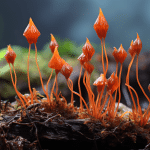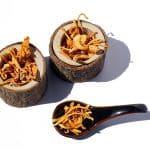Cordyceps does indeed increase dopamine. A 2014 study published in Evidence-Based Complementary and Alternative Medicine showed cordyceps supplementation reduced inflammation markers in the brains hippocampus. Cordyceps alleviated symptoms of depression in rats through activation of the adrenaline and dopamine receptors in the brain. Cordyceps decreased pain in rats, more effectively than a control drug, phenylbutazone, commonly used for treating pain in animals.
Cordyceps mushrooms may also be used as a nootropic to treat people suffering from ADHD or ADD, since it helps improve brain dopamine levels. If you are looking for a natural supplement that gives your brain the boost it needs, without any detrimental side effects, then cordyceps mushrooms are certainly the way to go. Cordyceps mushrooms are mostly used because of their ability to increase energy levels and foster better mental clarity.
The Cordyceps sinensis mushrooms are described from ancient Chinese medicine books, as well as being found in Tibetan medicine. In recent years, scientists have studied the medical benefits of cordyceps sinensis mushrooms. Within the genus cordyceps, more than 400 species have been described to date, among them, Cordyceps sinensis, also called as the winter worm, the summer grass, has been recognized for centuries as the best-known tonic grass in Traditional Chinese Medicine (TCM).
According to animal studies, cordyceps can be a good nootropic, and a protective medicine for brain. Cordyceps may also support against neuroinflammation, but it can also enhance our ability to utilize brain oxygen for promoting energy-hungry cognitive processes.
Cordyceps slowed the cancer growth, reduced the size of the tumors, and increased the survival time of mice with skin, immune cells (lymphoma), lung, and liver cancers. In mice with premature aging, cordyceps increased levels of key antioxidants, reduced oxidative stress, and improved brain and sexual function . More than 200 clinical studies have shown that the mushrooms in cordyceps enhance productivity through increased blood flow, increased ATP synthesis to produce more natural energy, acting as antioxidants, increased lactate disposal, increased catecholamine release, and reduced oxidative stress, fatigue.
Cordyceps Affects on Dopamine
Cordyceps mushrooms are known for increasing dopamine levels without impacting your heart rate or blood pressure. Cordyceps sinensis is capable of increasing the dopamine and noradrenaline activities through increasing the levels of tyrosine hydroxylase, by modulating MAO-B, and by some unknown mechanism. From current studies, it is known to increase dopamine and noradrenaline activity, and also the AMPA receptor activity.
Cordyceps sinensis has potent antioxidant effects, improving energy and decreasing fatigue, decreasing stress, fatigue, and cholesterol, and also decreasing some effects of aging. Evidence suggests that the cordyceps mushroom has antidepressant, antifatigue effects through the upregulation of dopamine D2 receptors, and increases expression of a rate-limiting enzyme, tyrosine-hydroxylase, that converts L-tyrosine into L-DOPA (which is then converted into dopamine).
Cordyceps supplementation also increases levels of neurotrophic growth factor, which originates in the brain, and 5-HTP (a precursor of serotonin and norepinephrine). Cordyceps shares a lot of the same benefits of other medicinal mushrooms, like its effects on supporting the immune system and relieving inflammation, for example, but there is also something else that really helps this mushroom stand out from the pack.
You can find our favorite capsules, powders, and tincture’s on the following pages of our website and learn more about each individually:
List of The Best Cordyceps Supplement
List of The Best Cordyceps Powder
List of The Best Cordyceps Tincture
List of The Best Cordyceps Mushroom Gummies
Additional Resources:
Updated 10/17/2022















